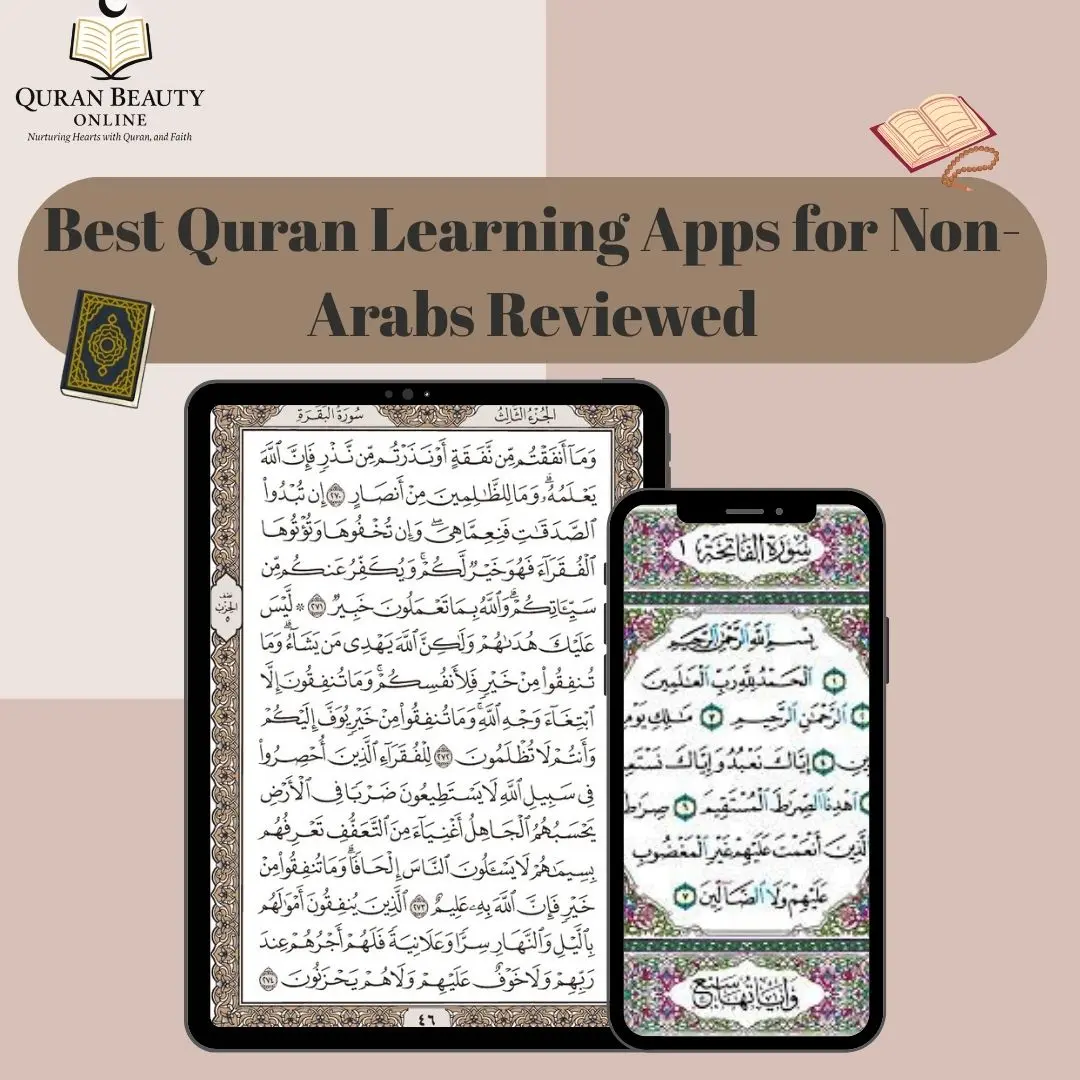Best Quran Learning Apps for Non-Arabs Reviewed

With the best Quran learning apps for non-Arabs learning Quran has never been easier. For many non-Arabs, learning the Quran can be a scary task, especially if you have little background in the Arabic language. Luckily, with the advance of technology, this task is easier than ever.
You no longer need to be sitting in a classroom, using a physical Mushaf, but can simply access the Quran and its teachings using your phone or tablet.
In this article, we will present the best Quran learning apps specially designed with the Non-Arabic speaker in mind. Whether it is for better pronunciation, translation to understand meanings, or simply to have a starting point to allowing memorization of the Quran, these apps provide strong support for your journey.
Best Quran Learning Apps for Non-Arabs Reviewed
Below are several of the best apps, with features, pros, and cons, especially for non-Arabic learners (beginners, those needing translations, Tajweed, memorization, etc.).
1. Quran Majeed
Offers the full Quran in Arabic, proofread by scholars.
Has multiple high-quality reciters (Sheikh As-Sudays, Mishari Rashid, Saad Al Ghamdi, etc.) to choose from.
- Provides translations in 45+ languages, plus audio translation options in some languages.
- Supports transliteration (so non-Arabic speakers can see the phonetic rendering).
- Memorization tools: repetition of Ayahs, adjustable recitation speed, interval & number of repeats.
Other helpful features: multiple themes (night mode etc.), bookmarks, search, tafsir (several classical ones), audio playback in background, Quran engagement tracking, etc.
Why it works well for Non-Arabs?
This is one of the Quran ijazah online for non-Arabs because it has translation + transliteration + audio reciters, someone who doesn’t read or speak Arabic can follow, listen, understand meaning, and learn pronunciation.
The repetition / memorization tools help internalize recitation even if one is weak in Arabic.
The UI settings (themes, adjustable text etc.) help readability, which matters when learning a new script.
Weaknesses / Things to consider
Some complaints about ads and notifications being a bit heavy, especially in free versions.
The Tajweed-coloring or Tajweed rule guidance is less strong than apps dedicated to Tajweed learning. If someone wants deeply structured Tajweed lessons, they might want to combine this with a more Tajweed-focused app.
Large audio files / downloads may take storage space. For offline usage, high storage required.
2. Learn Quran Tajwid
Provides comprehensive Tajwid lessons, from very basic (letters, vowels, Harakaat) to more advanced rules.
Uses a structure of theory, practice, test: After teaching a rule, gives examples, practice, and then quizzes/tests to check comprehension.
Offers placement test to find the learner’s current level.
Includes audio examples, pictures or videos (for something like makharij – how to produce the letters), so multi-sensory learning.
Why it’s especially good for Non-Arabs?
If you don’t know much Arabic, the tajwid rules and phonetics are essential. This one of the best Quran learning apps for non-Arabs gives a structured path to learn pronunciation correctly, not just reading.
The theory + practice + test format is helpful: you get both explanation and immediate feedback.
Visual aids (videos, images) help learners who can’t hear or read well, making abstract concepts more concrete.
Weaknesses / Things to consider
Free version is ad-heavy; some users report many ads or prompts to upgrade.
Some audio download / offline limitations. Some lessons or audio files may require internet or may fail to download.
For someone wanting memorization or audio review, this is more focused on reading & Tajweed than memorization tools.
3. Tarteel
An app that uses AI-powered memorization and recitation tools. It listens to your recitation and gives feedback, tracks your progress.
Memorization Mistake Detection: if you miss a word, say a wrong word, or add an extra word, the app flags it so you can focus review there.
Hidden verses mode: you recite without seeing the text, so your memorization is tested.
Goals / progress tracking: users can set what part they want to memorize, deadlines or pace, then the app helps plan sessions.
Audio playback of your own recitation, so you can listen back and compare.
Why it’s especially well-suited for Non-Arabs?
For memorization especially, hearing your own recitation and comparing helps you notice mistakes in pronunciation you might not catch otherwise.
One of the things that makes this the best Quran learning apps for non-Arabs is that mistake detection helps correct small errors early (very beneficial for someone not familiar with Arabic subtleties).
Hidden verses mode pushes active recall which is stronger than passive reading; helps internalize verses even if you don’t fully understand every word yet.
Weaknesses / Things to consider
The mistake detection is not yet perfect; for example, it doesn’t fully include Tajweed or full pronunciation correction in many cases, it flags when words are missed or wrong but not every Tajweed rule.
Premium features may be needed for some of the more advanced tools.
As with any AI audio-tool, clarity of recitation and background noise may affect accuracy.
4. Muslim Pro
Very popular “all-in-one” lifestyle / Quran app. Quran reading + prayer times + Qibla + other features.
- Quran part: includes full text in Arabic, colored Tajweed to help guide pronunciation.
- Many translations (40+), plus audio recitations by multiple reciters. Ability to download audio for offline.
- A memorization tool: the “Memorise / Learn” section where you can mark surahs or ayas to memorise, review ones that “Need Practice”, etc. Flash-card / card style interface.
- Extra features to support daily engagement, such as “Daily Deen” notifications and reminders to listen or read.
Why it helps Non-Arabs
This is one of the best Quran learning apps for non-Arabs because of the many translations + colored Tajweed, you can read and also understand, plus get feedback on correct pronunciation.
Offline audio is great when internet is spotty.
The memorization tool helps break up the journey so you don’t get overwhelmed.
Weaknesses / Things to consider
Some features locked behind premium / paid subscription. If you want offline audio, sometimes that’s premium.
Because it’s an “all-in-one” app, the depth of teaching certain advanced Tajweed rules or phonetics may not match specialist Tajweed apps.
Some users might find the interface visually busy, or that notifications distract.
5. Ayat – Al Quran
Serves as a digital Mushaf (Qur’an text) with scanned soft copies of actual print Mushafs (e.g. Madina Mushaf, Warsh Mushaf etc.), Mushaf Tajweed-colored script, etc.
- Audio recitations by famous reciters. Ability to repeat Ayahs with time-interval settings.
- Multiple Tafsir/commentaries: Several classical Arabic Tafsir, some English/Urdu and other translation options.
- Supports translation in many languages (20+). Also voice translation / audio translation for certain languages (English, Urdu).
- Synchronization: as recitation plays, verses / Ayahs are highlighted to follow along.
Why it’s helpful for Non-Arabs
The Mushaf style familiar layout helps learners see how a print Qur’an looks; helps them learn Arabic script structure, where verses begin/end.
The ability to repeat Ayahs, slow recitation, audio + translations, helps bridge gaps in comprehension and pronunciation.
Use of different scripts (Warsh, Tajweed-coloured) helps with dialect / recitation style choices.
Weaknesses / Things to consider
Less focus on interactive lessons/quizzes or active feedback (e.g. correcting your own pronunication) compared to apps like Tarteel or Learn Quran Tajwid.
The widget features etc. are more for reading and spiritual reminders than structured learning.
Some may prefer more transliteration or phonetics if they are totally beginners; this may be less emphasized.
Summary Comparison: Which App Fits Which Need
| Learner Profile / Goal | Best Choice(s) |
| Complete beginner who can’t read Arabic, needs guided pronunciation + structure | Learn Quran Tajwid + Quran Majeed |
| Memorization focus, wanting feedback on mistakes | Tarteel |
| Want to read, listen, understand translations + engage daily, but less interested in deep Tajweed structure | Muslim Pro |
| Prefer Mushaf layout, want classic print look, good reciters, repeated Ayahs, many translations | Ayat |
| Want full control on recitation speed, repeating, offline audio, multiple languages | Quran Majeed and Muslim Pro both good |
While the best Quran learning apps for non-Arabs can give you a great start, nothing replaces the guidance of a qualified teacher, especially for mastering Tajweed and building confidence in recitation. That’s where Quran Beauty Online comes in.
With experienced teachers, personalized lessons, and structured courses tailored for Non-Arabic speakers, you’ll get the one-on-one guidance that apps alone can’t provide.
Whether you’re a beginner learning Al-Qaida Noorania, an adult improving your Tajweed, or a parent helping your child recite correctly, Quran Beauty Online has a course for you.
Take the next step in your Quran journey, Book a Free Trial Class with Quran Beauty Online and see how learning with a live teacher can transform your experience.







